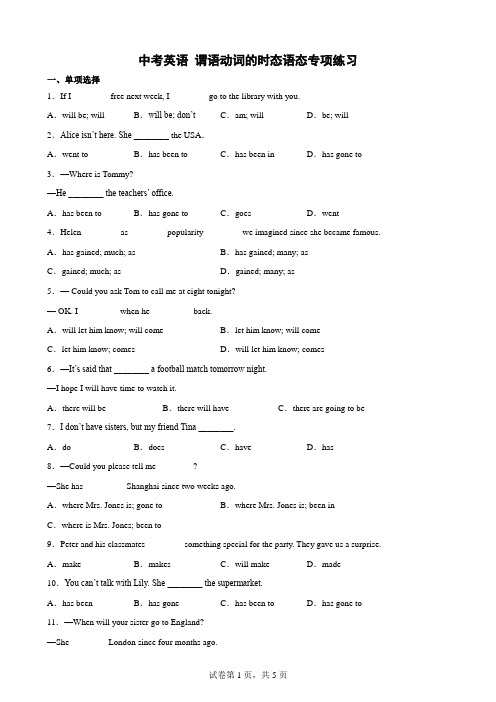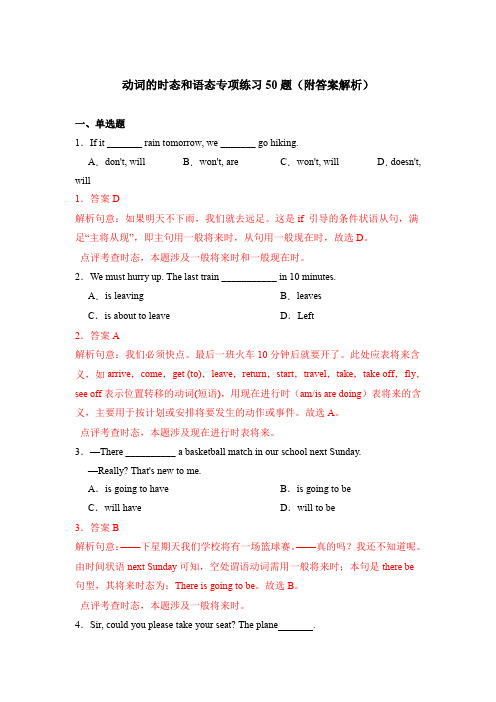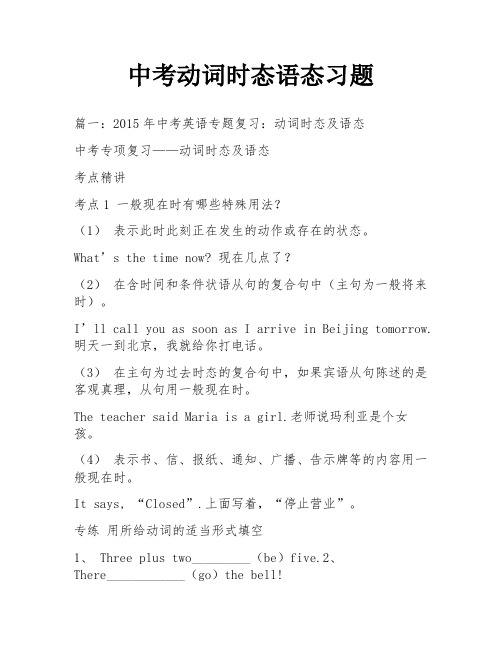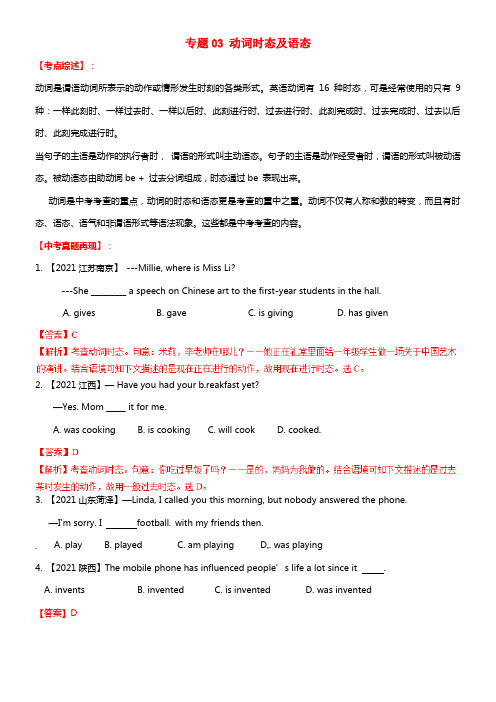中考 动词、动词时态与语态专项
中考英语专项提分复习专项 (十一)—动词的时态和语态

中考复习专项(十一)——动词的时态和语态1.(2020·重庆中考)Listen! Our teacher ______ in the music classroom.A.sings B.sang C.will sing D.is singing2.(2020·重庆中考)Don’t drink coffee before going to bed, or you ______ easily.A.don’t fall asleep B.won’t fall asleepC.didn’t fall asleep D.haven’t fallen asleep3.(2020·甘肃中考)I want a mobile phone which ______ good pictures.A.took B.is taking C.takes D.take4.My mother ________ a good example for me since I was young.A. wasB. has beenC. will beD. is5.When I was in primary school, the books ________ me to a wonderful world.A. broughtB. are bringingC. bringD. have brought6.(2020·吉林中考)Tom ______ when I called him yesterday.A.read B.is reading C.was reading7.(2020·重庆A卷中考)Another bridge over the Jialing River ______ last year.A.builds B.built C.is built D.was built8.(2020·海南中考)Many successful businessmen ______ to Hainan to give advice on how to build Hainan Free Trade Port.A.invite B.are invited C.are inviting9.(2020·扬州中考)—Have you tasted baozza, a mixture of pizza and baozi?—Sure.Thousands of baozza ______ at a baozi factory in Yangzhou each day next month.A.will make B.makes C.was made D.will be made10.(2020·泰州中考)This pair of trousers ______ smooth because they are made of Chinese silk.A.feels B.feel C.is felt D.are felt思考并总结:中考真题中关于动词的时态和语态的考点主要有哪些?你觉得自己哪一部分最需加强?请在下述思维导图中用红笔重点标出自己的易错点并分享出来。
2023年中考英语强化训练---倒装句、动词的时态和语态

中考英语强化训练---倒装句、动词的时态和语态一、倒装句1. Tom and I belong to a team. If he doesn't agree on the plan, ________.A. neither do I.B. neither I will.C. nor do I.D. neither will I.2.—______—I'm looking forward to meeting him!A. Here comes him!B. Here him comes!C. Here comes he!D. Here he comes!3.—I ________ a good breakfast this morning.—Neither ________ I. Let's go and buy some snacks.A. hadn't; hadB. didn't have; hadC. didn't have; didD. hadn't; did4. There ________ little meat in the fridge. Let's go and buy some.A. hasB. isC. areD. isn't5. Nowadays, there ____ more heroes in China. We admire thema lot.A. isB. areC. wasD. were6.—Li Ping, I didn't go summer camping last year.—______.A. So did IB. Neither did IC. Neither I didD. So I did7. There ________ a teacher and many students in the classroom.A. haveB. hasC. areD. is8. There ________ two pet cats at Becky's home.A. haveB. isC. are9.—There _____ two basketball games on TV tomorrow night. —Really? That's wonderful.A. isB.wasC. areD.will be10.—Are there going to be any young trees?—Yes, _____.A. there beB.there isC. there areD. there are going to11.There ________ only one earth but billions of (数十亿) people in the world, so we should protect the earth.A. haveB. isC. are12. Once a term, there ________ a parents' meeting in our school.A. isB. areC. wasD. were13. There ______ some milk and several apples in the fridge.A. isB. areC. be14.—John had a good time yesterday.—_______A. So did Tom.B. So Tom was.C. So Tom did.D. So was Tom.15. Mr. Zhang gave a speech at the opening ceremony, and ______.A. so does Mr. LeeB. so Mr. Lee doesC. so did Mr. LeeD. neither did Mr. Lee16. Look, here ______ Mr. Wu. Let's go and tell him everything about it.A. is comeB. comesC. comingD. come17.—This book is very interesting. I have read it many times.—______.A. So I haveB. So have IC. So I didD. So did I18.—I'm very interested in listening to the folk music in western China.—______.A. So I amB. So am IC. So I doD. So do I19.—I could ride a bike when I was young.—______.A. So I couldB. So could IC. I can, tooD. I couldn't either20.—Jim is good at English.—______ He often speaks to foreigners.A. So is he.B. So he is.C. So was he.D. So he was.21.—I think the plan is just a waste of time. —Well, if you don't support it, ________.A. so will IB. so am IC. neither will ID. neither do I22. If you don't go hiking this Sunday, _______.A. so will IB. so do IC. neither will ID. neither do I23.—David has made great progress recently.—______ and ______.A. So he has; so you haveB. So he has; so have youC. So has he; so have you24.—It was the Dragon Boat Festival last Sunday. I drove to the Lianhua Lake to watch the boat races.—_____, but I didn't see you there.A. So I didB. So did IC. So do ID. Neither did I25. Only at that time _______ that he was wrong.A. he realizedB. did he realizeC. he did realize26.—I hear Lily made an English speech at the graduation ceremony yesterday.—_____ and _____.A. So did she; so I didB. So she did; so did IC. So she did; so I wasD. So did she; so I was27.一Peter has made great program in English recently. —_____________. He has been studying so hard these days.A. So have heB. So he hasC. So he haveD. So has he28.—Will you go to the park tomorrow?—If you don't, _____.A. so do IB. so will IC. neither do ID. neither shall I29.—I never go to bed late and get up late.—________.A. So does JillB. So is JillC. Neither does JillD. Neither is Jill30. There ________ some milk and some fruit on the table.A. isB. areC. beD. aren't二、动词的时态和语态1.—I wonder if Mike ______ swimming this afternoon. —If he ______ his homework, he will go with us.A. goes; finishesB. will go; finishesC. goes; will finishD.will go; will finish2.Chinese ________ widely all over the world because ofChina's rapid development.A. speaksB. was spokenC. is spoken3.—Mike, you _______ the magazine since last week. Can you return it now?—Sure.A.borrowedB.have borrowedC.have kept4.The film ______ for fifteen minutes.A.beganB.has begunC.has been on5.—Is Lucy at home ?—No. She ______ the cinema. She ______ there twenty minutes ago.A.has gone to; wentB.has gone to; has beenC.has been to; went6.Tomorrow is Saturday, we ________ my grandparents.A. visitB. are going to visitC. will visitsD.are visiting7.—What did you do last weekend, Judy?—I ________ the science museum with my father.A. visitB. visitedC. have visitedD. will visit8.The National Day of the People's Republic of China ________ on October 1st every year.A. was celebratedB. is celebratedC. has been celebratedD. will be celebrated9.—I wonder if Miss Lin ________ back in a week.—I think she will call us if she ________ back.A. will come; will comeB. comes; will comeC. will come; comes10.—Who's the old woman in the photo?—This is my grandma. She ________ for 5 years. I miss her very much.A. has been deadB. has diedC. died11.Gina went to the doctor's yesterday and she ______ about the importance of good living habits once more.A.toldB.is toldC.was toldD.has told12.—Celia, join us in the Super Summer Camp if it _______ this weekend.—I'd love to. But nobody knows if it ______.A.is fine; rainsB.is fine; will rainC.will be fine; will rainD.will be fine; rains13.—Perfect photos! Good skills!—Thank you. They________ by my Huawei mobile phone. A.took B.were takenC.will be takenD.are taking14.—Excuse me, could you please tell me if the sportsmeeting _____ on time?—It depends. If it _____ tomorrow, we'll have to put it off.A. will start; rainsB. starts; rainsC. will start; will rainD. starts; will rain15.—The film Nezha is so wonderful. You shouldn't miss it. —If I have time, I _________ it.A.will watchB.watchC.watchedD.washes16.—Have you seen our English teacher?—Yes, I ______ her in the library just now.A.have metB.metC.meet17.—What are you going to do this weekend?—I will go to Hefei __________ it doesn't rain this weekend.A. whenB. untilC. ifD. and18.—Would you like something to eat, Mary?—Of course. Although I __________ lunch, I am feeling a little hungry now.A. will haveB. haveC. am havingD. had19.—Hi, Jane, tell you a piece of good news. I _____ America tomorrow.—Wow, enjoy yourself!A.left forB.leaves forC. am leaving for20.—Water pollution is still a serious problem around the world.—I think so. If more clean water ________, it will help to solve the problem of water shortage.A. protectsB. is protectedC. has been protectedD. has protected21.—Do you know where Claudia is?—Yes, she's in Room 303. When I saw her, she ______ a drum.A.beatB.was beatingC.will beat22.There _______ an English party in our class next week.A. is going to haveB. is going to beC. will have23.Our neighbors welcomed us warmly as soon as we ________.A.arrivedB.arriveC.will arrive24.Many topics ________ in the course, ________ food and drinks, travel and hotels.A. cover; includeB. are covered; includingC. covers; includingD. are covered; include25.Could you tell me if Li Lei ________ to my party?A. will comeB. comesC. comingD. came26.—You look unhappy, what happened?—Bad luck. I planned to go to Shenzhen, but the plane________ when I ________ at the airport.A. has left; arrivedB. had left; arrivedC. left; arrives27.Steve ______ English every morning.A. readsB. readC. is reading28.These flowers ________ three times a week in such hot weather, or they may die.A. should waterB. shouldn't waterC. should be wateredD. shouldn't be watered29.A lot of trees ________ on the hill yesterday.A. are plantedB. will be plantedC. have been plantedD. were planted30.I'm sorry the coats in this color ________ yesterday. Would you like to try another one?A.was sold outB.are sold outC.has been sold outD.were sold out。
中考英语谓语动词的时态语态专项练习

A.keepB.buyC.have keptD.have bought
36.Li Ming’s grandmother ________ for many years.
A.has diedB.diedC.has been dead
37.—Jin Yong ________ for over a year, but his works will live in our hearts forever.
中考英语 谓语动词的时态语态专项练习
一、单项选择
1.If I ________ free next week, I ________ go to the library with you.
A.will be; willB.will be; don’tC.am; willD.be; will
2.Alice isn’t here. She ________ the USA.
14.How amazing it is! China ________ forty-three BeiDou Satellites successfully.
A.sendsB.sentC.has sentD.will sent
15.—Excuse me, when did the movieThe Battle at Lake Changjinbegin?
8.—Could you please tell me ________?
—She has _________ Shanghai since two weeks ago.
A.where Mrs. Jones is; gone toB.where Mrs. Jones is; been in
初中英语动词的时态和语态专项练习50题(附答案解析)

动词的时态和语态专项练习50题(附答案解析)一、单选题1.If it _______ rain tomorrow, we _______ go hiking.A.don't, will B.won't, are C.won't, will D.doesn't, will1.答案D解析句意:如果明天不下雨,我们就去远足。
这是if 引导的条件状语从句,满足“主将从现”,即主句用一般将来时,从句用一般现在时,故选D。
点评考查时态,本题涉及一般将来时和一般现在时。
2.We must hurry up. The last train ___________ in 10 minutes.A.is leaving B.leavesC.is about to leave D.Left2.答案A解析句意:我们必须快点。
最后一班火车10分钟后就要开了。
此处应表将来含义,如arrive,come,get (to),leave,return,start,travel,take,take off,fly,see off表示位置转移的动词(),用现在进行时(am/is are doing)表将来的含义,主要用于按计划或安排将要发生的动作或事件。
故选A。
点评考查时态,本题涉及现在进行时表将来。
3.—There __________ a basketball match in our school next Sunday.—Really? That's new to me.A.is going to have B.is going to beC.will have D.will to be3.答案B解析句意:——下星期天我们学校将有一场篮球赛。
——真的吗?我还不知道呢。
由时间状语next Sunday可知,空处谓语动词需用一般将来时;本句是there be句型,其将来时态为:There is going to be。
中考动词时态和语态综合练习题-最新

中考动词时态和语态综合练习题·最新说明:本文是针对中考英语动词时态和语态知识的专项练习,通过对历年试题的分析和总结,针对性的设计了专项训练的题型和考察知识点,内容涵盖了分类试题和精准解析,此文是老师和同学们复习提升和检验知识掌握的最佳选择,希望对大家有所帮助。
一、用所给动词的适当形式填空1.Summer _______(follow)spring.【答案】follows【详解】句意:春去夏来。
可知考查一般现在时态,说明一种客观事实,主语Summer 是第三人称单数,所以动词要用第三人称单数形式,故答案为:follows2.he students are often _______(divide(into several groups by the teacher before discussing the difficult questions in class.【答案】divided【详解】句意:在课堂上讨论难题之前,老师经常把学生分成几个小组。
divide“分开”,主语students与动词divide之间构成被动关系,用被动语态be done的结构,空格前已有助动词are,此空应填过去分词,故填divided。
3.Paper Shoot ________ (work) just like any other camera.【答案】works【详解】句意:Paper Shoot的工作原理和其他相机一样。
此处在句中作谓语,时态是一般现在时,主语是第三人称单数,动词work用第三人称单数形式,故填works。
4.Students will ________ (require) to understand and master the basics of home cooking .【答案】be required【详解】句意:学生将被要求了解和掌握家庭烹饪的基本知识。
根据“Students will be …to understand and master the basics of home cooking”及备选词可知,要求学生掌握这些技能,require“需要”,此处是被动语态,故此空应填过去分词,故填be required.st Saturday she ________ (stop) her car at some traffic lights because they were red, and then the car didn’t start again.【答案】stopped【详解】句意:上星期六,她在交通灯前停车,因为交通灯是红色的,然后车又发动不起来了。
中考动词时态语态习题

中考动词时态语态习题篇一:2015年中考英语专题复习:动词时态及语态中考专项复习——动词时态及语态考点精讲考点1 一般现在时有哪些特殊用法?(1)表示此时此刻正在发生的动作或存在的状态。
What’s the time now? 现在几点了?(2)在含时间和条件状语从句的复合句中(主句为一般将来时)。
I’ll call you as soon as I arrive in Beijing tomorrow.明天一到北京,我就给你打电话。
(3)在主句为过去时态的复合句中,如果宾语从句陈述的是客观真理,从句用一般现在时。
The teacher said Maria is a girl.老师说玛利亚是个女孩。
(4)表示书、信、报纸、通知、广播、告示牌等的内容用一般现在时。
It says, “Closed”.上面写着,“停止营业”。
专练用所给动词的适当形式填空1、 Three plus two_________(be)five.2、There____________(go)the bell!3、Light______________(travel)faster than sound.4、If you____________(ask)her tomorrow, she will help you.5、The notice _______________(say)“No Smoking!”.考点2 如何使用used to?used to后加动词原形表示“过去常常”,其疑问句和否定句可直接使用used,也可借助于did。
I used to be afraid of dark .我过去常怕黑。
He usedn’t to ride to school.他过去不常骑车去上学。
H e used to smoke, didn’t he?他过去常抽烟,是吗?注意:be used to doing 意为“习惯做某事”, be used to do 意为“被用来……”,不要混淆。
动词和动词短语 、动词时态和语态、主谓一致 单句语法填空+单句改错——语法考点(动词篇)

考点14 动词和动词短语·单句语法填空单句改错·语法考点(动词篇)【考题14】单句语法填空。
1. The pen writes ______ (smooth).2. All the passengers must remain ______ (seat) until the bus has stopped completely.3. Remember ______ (turn) off the lights before you leave.4. Do you remember ______ (see) me before?5. We have been reading books for ten minutes. Let’s stop ______ (have) a rest.6. Having finished the exercises, we went on ______ (learn) the new words in the unit.7. After a short rest,they went on ______ (work).8. He stopped ______ (talk) when the bell rang.9. While working, he stopped ______ (talk) to with Tom at times.10. I try not ______ (think) about that.11. Would you please try ______ (do) that again?12. I mean ______ (change) it for another one.13. Missing the train means ______ (wait) for another hour.14. Please permit me ______ (say) a few words.15. We don’t permit ______ (smoke) here.16. These group of people are those who aren’t allowed ______ (enter) the room17. The room needs ______ (clean).18. The book deserves ______ (read).19. I prefer ______ (walk) to school every day.20. I prefer ______ (stay) at home today.21. We began ______ (do) that job last year.22. When the teacher came into the room,he was starting ______ (write) to his parents.23. Hearing the news,he started ______ (think) of a good way to solve the problem.24. We were about to leave when it began ______ (rain).25. I am so busy these days,so I can’t help ______ (decorate) your house.26. I can’t help ______ (laugh) when I see his funny clothes.27. Look forward ______ (avoid) running into any car.28. I am looking forward to ______ (receive) your letter.KEYS:1. smoothly2. seated3. to turn4. seeing5. to have6. to learn7. working8. talking9. to talk 10. to think 11. doing 12. to change 13. waiting 14. to say 15. smoking 16. to enter17. cleaning/ to be cleaned 18. reading/ to be read 19. walking 20. to stay21. doing/ to do 22. to write 23. to think 24. to rain25. (to) decorate 26. laughing 27. to avoid 28. receiving考点15 动词的时态和语态·单句语法填空单句改错·语法考点(动词篇)【考题15】单句语法填空。
中考英语备考 专题03 动词时态及语态(含解析)

专题03 动词时态及语态【考点综述】:动词是谓语动词所表示的动作或情形发生时刻的各类形式。
英语动词有16种时态,可是经常使用的只有9种:一样此刻时、一样过去时、一样以后时、此刻进行时、过去进行时、此刻完成时、过去完成时、过去以后时、此刻完成进行时。
当句子的主语是动作的执行者时,谓语的形式叫主动语态。
句子的主语是动作经受者时,谓语的形式叫被动语态。
被动语态由助动词be + 过去分词组成,时态通过be 表现出来。
动词是中考考查的重点,动词的时态和语态更是考查的重中之重。
动词不仅有人称和数的转变,而且有时态、语态、语气和非谓语形式等语法现象。
这些都是中考考查的内容。
【中考真题再现】:1. 【2021江苏南京】---Millie, where is Miss Li?---She _________ a speech on Chinese art to the first-year students in the hall.A. givesB. gaveC. is givingD. has given2. 【2021江西】— Have you had your b reakfast yet?—Yes. Mom _____ it for me.A. was cookingB. is cookingC. will cookD. cooked3. 【2021山东菏泽】—Linda, I called you this morning, but nobody answered the phone.—I'm sorry. I football with my friends then.A. playB. playedC. am playingD. was playing4. 【2021陕西】The mobile phone has influenced people’s life a lot since it .A. inventsB. inventedC. is inventedD. was invented【答案】D【解析】考查动词时态及语态。
- 1、下载文档前请自行甄别文档内容的完整性,平台不提供额外的编辑、内容补充、找答案等附加服务。
- 2、"仅部分预览"的文档,不可在线预览部分如存在完整性等问题,可反馈申请退款(可完整预览的文档不适用该条件!)。
- 3、如文档侵犯您的权益,请联系客服反馈,我们会尽快为您处理(人工客服工作时间:9:00-18:30)。
动词、动词时态与语态专项一、动词总结:1)表示动作中状态的词叫做动词。
2)根据其在句中的功能,动词可分为四类,分别是:实义动词(Notional Verb)、系动词(Link Verb)、助动词(Auxiliary Verb)、情态动词(Modal Verb)。
说明:有些情况下,有些动词是兼类词,例如:We are having a meeting.我们正在开会。
(having是实义动词。
)He has gone to New York.他已去纽约。
(has是助动词。
)3)动词根据其后是否带有宾语,可分为两类,分别是:及物动词(Transitive Verb)、不及物动词(Intransitive Verb),缩写形式分别为vt. 和vi.。
说明:同一动词有时可用作及物动词,有时可用作不及物动词。
例如:She can dance and sing.她能唱歌又能跳舞。
(sing在此用作不及物动词。
)She can sing many English songs.她能唱好多首英文歌曲。
(sing用作及物动词。
)4)根据动词的组成形式,可分为三类,分别是:单字词(One-Word Verb)、短语动词(Phrasal Verb)、动词短语(Verbal Phrase)例如:The English language contains many phrasal verbs and verbal phrases.英语里有许多短语动词和动词短语。
(contains是单字动词。
)Students should learn to look up new words in dictionaries.学生们学会查字典。
(look up是短语动词。
)The young ought to take care of the old.年轻人应照料老人。
(take care of是动词短语。
)5)动词有五种形态,分别是:原形(Original Form)、第三人称单数形式(Singular From in Third Personal)、过去式(Past Form)、过去分词(Past Participle)、现在分词(Present Participle)。
二、动词的时态1、一般现在时主要用于下面几情况:1) 描述当前时间内经常出现、反复发生的动作或存在的状态。
在这种情景中,句子常带有表示频率的时间状语:always , everyday , often , once a week (month , year , etc.) , sometimes , usually等等,以表示句中的动作或状态是习惯性的、经常性的。
例如:They raise ducks as a sideline .他们以养鸭为副业。
She doesn't often write to her family, only once a month. 她不常给家里写信,仅一月一封而已。
I cycle to work every day .我每天骑自行车上班。
It seldom rains here .这儿很少下雨。
2) 陈述客观事实、客观真理。
顾名思义,客观的情况是"没有时间概念"的;也"不会在意动作进行的状态"。
例如:The sun rises in the east .日出东方。
The earth goes around the sun .地球绕着太阳转。
Light travels faster than sound .光的速度比声音的速度快。
3) 根据英文语法规定,当主句的谓语动词是一般将来时,那么时间或条件状语从句的谓语动词只能用一般现在时来表示将来要发生的动作。
例如:I'll tell him the news when he comes back. 他回来时,我将告诉他这个消息。
If you take the job , they will talk with you in greater details.如果你接受这份工作,他们将和你谈谈细节。
用于一般现在时的副词,除了上面提到的一些表示频率的以外,常见的还有:now, today , nowadays等等。
2、一般过去时主要是用来描述在过去某个时候发生的动作或存在的状态。
它也可以用来表示在过去某段时间里经常发生的习惯性动作。
这一点在表达意义上与一般现在时相同,只是所在的时间区域不同而已。
由于它的主要作用如此,所以在使用一般过去时的句子里常常有一个意义较具体的过去时间状语。
这也是它与现在完成时的最大区别之一。
一般过去时由谓语动词的过去式表示,也就是说动词词末要加-ed(除不规则动词外)。
常和一般过去时连用的过去时间状语有:last night (week , month , year , century , etc.) , yesterday , the day before yesterday , yesterday morning ( afternoon , evening ) , in 1999 , two hours ago ( one week ago , three years ago , …)等等。
使用一般过去时,在某种意义上说就是要强调动作或状态发生或存在于过去的某个时候。
"过去"的时间概念有两层意思:一是指"现在某个时间"以前的时间;二是指"说话、写文章的那个时间点"以前的时间,在这个意义上,"现在的那个时间点"是很小很小的,甚至于小到无法量化的程度。
例如:He got his driving license last month. 他上个月拿到了驾照。
--Where's Jim? 吉姆在哪里?--He just went out.他刚刚出去。
3、一般将来时主要用来描述将要发生的动作或存在于未来的情况。
这里所说的"将来时间"是指"说话、写文章那一刻以后的时间"。
句子有tomorrow,the day after tomorrow,next in the future 的短语它的表示方法主要有如下几种:1)shall / will + 动词原形这种表示方法是说,动作在现在或目前还未发生,要在将来的某个时间内发生;它没有主观性,是"纯粹的将来动作"。
例如:I shall / will not be free tomorrow .我明天没空。
He will arrive here this evening .他今晚抵达这里。
2) be( am / is / are ) + 不定式表示方法描述两钟情况:按计划安排要发生的动作,这个动作发生的时间一般不会很远;要求或命令他人做某事。
例如:A) The new bridge is to open to traffic in three days. 新桥三天后通车。
The factory is to go into production before National Day. 这家工厂国庆节前投产。
B) You are not to bring any mobile communication means into the exam-room .任何移动通讯工具都不得带入考场。
You are to stay home until your mother comes back. 你妈回来之前你不要出去。
4、过去将来时表示过去的某时以后将要发生的动作。
但这个"将来"时间绝不会延伸到"现在";而仅限于"过去时间区域内"。
由此可以看出,含这个时态的句子常带一个表示"过去某个时间点"的状语。
这个状语或是一个短语,或是一个句子。
这个时态常用于:宾语从句或间接引语中; When I thought about it , I wondered what their reaction would be .当我考虑这件事时,我想知道他们的反应是什么。
They knew that we would never permit such a thing. 他们知道我们绝不会允许发生这样的事。
5、现在进行时主要用来描述"说话、写文章的当刻"正在发生的动作,或是"现阶段"一直在进行的动作。
句子中若有now,listen,look,be quiet等时间提示语时,句子常用现在进行时它适用于下面的情况:1)"说话、写文章的当刻"正在发生的动作。
例如:They are having a football match .他们正在赛足球。
She is writing her term paper. 她正在写学期论文。
2)"现阶段"一直在进行的动作。
这种情况并不是说某个动作在说话的那会儿正在发生,而是说某个动作在当前一段时间内一直在进行着,或是重复地发生着。
例如:He is preparing for CET Band Six. 他在为大学英语六级考试作准备。
How are you getting along with your new job?你那份新工作干得怎么样?6、过去进行时主要表示在过去的某个时间点上正在发生、进行的动作。
由于它的定义是表示在过去的某个时间点上正在发生、进行的动作,所以,句子常带有一个表示"过去某个时间点"的状语。
这个状语可能是短语,词组,或是一个从句。
也可能是通过上下文来表达这层意思。
句子中若有at nine last night, the whole morning, this time yesterday,when the teacher came in等类似的时间状语,句子或主句常用过去进行时过去进行时主要用于下面的情景中:1)表示在过去某时刻正在进行的动作,例如:At this moment yesterday, I was packing for camp.昨天这个时候,我正在收拾东西去露营。
When I came to see her last time, she was writing an article.上次我来看她的时候,她正在写一篇文章。
What were you doing at eight last night ? 昨晚八点钟你在做什么?7、过去完成时态过去完成时的用法:过去完成时表示在过去某一时间或动作之前已经发生或完成了的动作。
